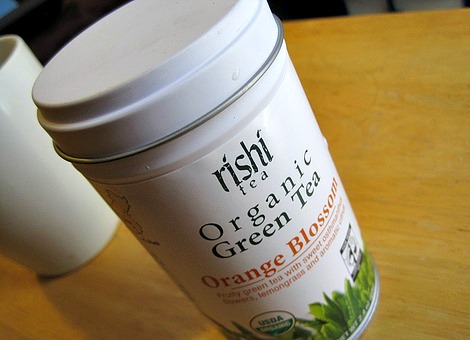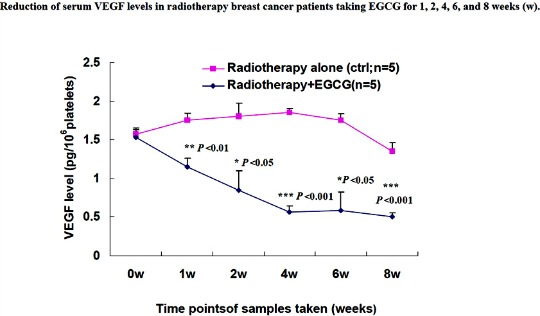EGCG and Breast Cancer
July 16, 2012 Written by JP [Font too small?]EGCG, a naturally occurring chemical in green tea, is the star of two new publications focusing on breast cancer. The first trial examined the role of epigallocatechin-3-gallate as an adjunct to radiation treatment in breast cancers patients. The second study investigated the potential of a purified ECGC “drug” to modulate hormones which fuel breast cancer growth.
According to researchers at Yantai University, a daily dosage of 1,200 mg of EGCG, taken as 400 mg thrice-daily for 8 weeks, works synergistically with radiotherapy. This determination was made by measuring the levels of “vascular endothelial growth factor (VEGF), hepatocyte growth factor (HGF)” and other biomarkers of cancer cell invasiveness and proliferation. Patients receiving the combination therapy vs those given only radiation exhibited lower levels of these substances and other indicators of cancer suppression.
A separate, two month trial using a placebo, 400 mg of EGCG or 800 mg of EGCG was recently conducted in a group of healthy postmenopausal women. The goal of the intervention was to identify whether EGCG positively affected levels of circulating hormones which might predispose older women to breast cancer. The findings were quite intriguing. The green tea extract did not provoke statistically relevant changes in sex hormone (estradiol, estrone or testosterone) concentrations. However, a decline in blood glucose, insulin and LDL (“bad”) cholesterol was reported. This may be relevant because insulin resistance, associated with high blood sugar, high insulin and dyslipidemia (which is partially characterized by high LDL cholesterol) is theorized as a possible risk factor for breast cancer.
It’s interesting to note that the latter study utilized Polyphenon E or PPE, a purified form of green tea that is being studied as an experimental medication. In order to derive a similar quantity of EGCG from traditionally brewed green tea, you’d need to drink between 5 to 10 cups of tea. This breaks down to approximately 80 mg of EGCG per cup. It seems like a lot, but there’s no reason why you only need to brew one tea bag per cup of tea. I frequently add three bags of green or white tea to my concoctions. The taste can be quite powerful, but so too can the health benefits. What’s more, the addition of other pleasant tasting ingredients (ginger, lemon, mint) helps mask any unpleasant notes imparted by the tea itself.
Note: Please check out the “Comments & Updates” section of this blog – at the bottom of the page. You can find the latest research about this topic there!
To learn more about the studies referenced in today’s column, please click on the following links:
Study 1 – Anti-Cancer Activities of Tea Epigallocatechin-3-Gallate in Breast Cancer … (link)
Study 2 – Effect of 2-Month Controlled Green Tea Intervention on Lipoprotein … (link)
Study 3 – Metabolic Syndrome and Breast Cancer: An Overview … (link)
EGCG + Radiotherapy May Improve Breast Cancer Treatment Efficacy
Source: Curr Mol Med. 2012 February; 12(2): 163–176. (link)
Tags: Breast Cancer, Green Tea, Insulin
Posted in Alternative Therapies, Food and Drink, Women's Health



July 16th, 2012 at 8:11 pm
JP, I wonder how much EGCG is in a cup of matcha green tea?
July 17th, 2012 at 10:58 am
Hi Iggy,
According to one study, “…the concentration of epigallocatechin gallate (EGCG) available from drinking matcha is 137 times greater than the amount of EGCG available from China Green Tips green tea, and at least three times higher than the largest literature value for other green teas.”
http://www.ncbi.nlm.nih.gov/pubmed?term=matcha%20tea%20egcg
Another reason to consider drinking matcha as a preferred source of green tea: https://www.healthyfellow.com/1211/matcha-tea/
Cheers!
JP
September 19th, 2015 at 11:45 am
Updated 09/19/15:
http://journals.lww.com/epidem/pages/articleviewer.aspx?year=9000&issue=00000&article=99136&type=abstract
Epidemiology. 2015 Sep 10.
Modifiable Lifestyle Factors and Triple-negative Breast Cancer Survival: A Population-based Prospective Study.
BACKGROUND: Very little is known about the effect of modifiable lifestyle factors on outcomes of triple-negative breast cancer. We examined this association in a population-based prospective cohort study of patients with triple-negative breast cancer.
METHODS: A total of 518 women with confirmed triple-negative breast cancer, recruited by the Shanghai Breast Cancer Survival Study, completed 6-, 18-, 36-, and 60-month postdiagnosis surveys. We applied Cox proportional hazard models to evaluate the associations.
RESULTS: The mean age at diagnosis was 53.4 (standard deviation = 10.6) years old. After a median follow-up of 9.1 years (range: 0.6-11.8), 128 deaths and 112 recurrences were documented. Exercise during the first 60 months postdiagnosis was inversely associated with total mortality and recurrence/disease-specific mortality with adjusted hazard ratios (HRs) of 0.67 (95% confidence interval [CI] = 0.46, 0.96) and 0.58 (95% CI = 0.39, 0.86), respectively. Women with higher exercise-metabolic equivalent scores (≥7.6 metabolic equivalent-hours/week) and longer duration of exercise (≥2.5 hours/week) had lower risk of total and recurrence/disease-specific mortality than did nonexercisers. Compared with nontea drinkers, survival was better among women who were regular tea drinkers during the first 60 months for all cause (HR = 0.57, 95% CI = 0.34, 0.93) and recurrence/disease-specific mortality (HR = 0.54, 95% CI = 0.31, 0.96). There was no dose-response pattern for tea consumption. No interactions were observed for body mass index, menopausal status, and comorbidity.
CONCLUSIONS: These findings show that postdiagnosis exercise and tea intake were associated with improved survival among women with triple-negative breast cancer.
Be well!
JP
January 20th, 2016 at 12:42 pm
Updated 1/20/16:
http://www.ncbi.nlm.nih.gov/pubmed/26783711
Antioxidants (Basel). 2015 May 27;4(2):373-393.
Food Inhibits the Oral Bioavailability of the Major Green Tea Antioxidant Epigallocatechin Gallate in Humans.
The bioavailability of the most abundant and most active green tea antioxidant, epigallocatechin gallate (EGCG) remains uncertain. Therefore, the systemic absorption of EGCG was tested in healthy fasted humans. It was administered as capsules with water or with a light breakfast, or when incorporated within a strawberry sorbet. The results for plasma EGCG clearly revealed that taking EGCG capsules without food was better; the AUC was 2.7 and 3.9 times higher than when EGCG capsules were taken with a light breakfast (p = 0.044) or with EGCG imbedded in the strawberry sorbet (p = 0.019), respectively. This pattern was also observed for Cmax and Cav. Therefore, ingesting food at the same time as EGCG, whether it was imbedded or not in food, substantially inhibited the absorption of the catechin. As with some types of medications that are affected by food, it appears that EGCG should be taken without food in order to maximise its systemic absorption. Therefore, based on these findings, ingesting EGCG with water on an empty stomach is the most appropriate method for the oral delivery of EGCG in clinical trials where EGCG is to be investigated as a potential bioactive nutraceutical in humans.
Be well!
JP
April 11th, 2017 at 6:14 pm
Updated 04/11/17:
http://www.mdpi.com/2072-6643/8/8/458/htm
Nutrients. 2016 Jul 28;8(8).
Suppressive Effects of Tea Catechins on Breast Cancer.
Tea leaf (Camellia sinensis) is rich in catechins, which endow tea with various health benefits. There are more than ten catechin compounds in tea, among which epigallocatechingallate (EGCG) is the most abundant. Epidemiological studies on the association between tea consumption and the risk of breast cancer were summarized, and the inhibitory effects of tea catechins on breast cancer, with EGCG as a representative compound, were reviewed in the present paper. The controversial results regarding the role of tea in breast cancer and areas for further study were discussed.
Be well!
JP
April 14th, 2017 at 11:49 pm
Updated 04/14/14:
http://cancerpreventionresearch.aacrjournals.org/content/early/2017/04/11/1940-6207.CAPR-16-0298.long
Cancer Prev Res (Phila). 2017 Apr 11.
A presurgical study of lecithin formulation of green tea extract in women with early breast cancer.
Epidemiologic data support an inverse association between green tea intake and breast cancer risk. Greenselect®Phytosome® (GSP) is a lecithin formulation of a caffeine-free green tea catechin extract. The purpose of the study was to determine the tissue distribution of Epigallocatechin-3-O-gallate (EGCG) and its effect on cell proliferation and circulating biomarkers in breast cancer patients. Twelve early BC patients received GSP 300 mg, equivalent to 44.9 mg of EGCG, daily for 4 weeks prior to surgery. The EGCG levels were measured before (free-) and after (total-) enzymatic hydrolysis by HPLC-MS/MS in plasma, urine, breast cancer tissue and surrounding normal breast tissue. Fasting blood samples were taken at baseline, before the last administration and 2 hours later. Repeated administration of GSP achieved levels of total-EGCG ranging from 17 to 121 ng/mL in plasma. Despite a high between-subject variability, total EGCG was detectable in all tumor tissue samples collected up to 8 ng/g. Median total-EGCG concentration was higher in the tumor as compared to the adjacent normal tissue (3.18 ng/g vs. 0 ng/g, P=0.02). Free-EGCG concentrations ranged from 8 to 65.8 ng/mL in plasma (P between last administration and 2 hours after <0.001). Free-EGCG plasma levels showed a significant positive correlation with the Ki-67 decrease in tumor tissue (P=0.02). No change in any other biomarkers was noted, except for a slight increase in testosterone levels after treatment. Oral GSP increases bioavailability of EGCG, which is detectable in breast tumor tissue and is associated with antiproliferative effects on breast cancer tissue.
Be well!
JP